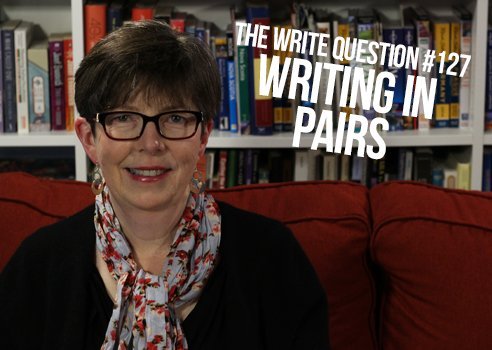Viewing time: 5 mins. 9 secs.
The Write Question is a weekly video podcast about writing that I started in 2017 and that ran, more or less weekly, until April 2022. This is a republication of issue #126, which discusses how to write with a partner. The post first ran on Feb. 7/20.
Transcript:
Have you ever wondered about writing with a partner? That’s the topic I’m addressing today in The Write Question. I’m Daphne Gray-Grant, the Publication Coach.
I have a question from Melissa Matthews, an academic based in Austin, Texas. Here’s what she asked by email….
“How can I write effectively with a partner or a group?”
Thanks for your question, Melissa. When I was in high school, my heart always sank when teachers asked us to do group projects. I was a hard worker who cared about getting good marks, and I knew I’d have to carry the load for people who didn’t care so much. And the apple doesn’t fall far from the tree. My three children felt the same way when they were in high school and university. They all detested group projects.
But as an academic, trying to get published in peer-reviewed journals, you won’t have much of a choice. Many journal articles involve a lead author and three or more sub-authors. You’re going to have to learn how to cooperate if you want to get yourself published.
In fact, the proportion of multi-author papers has increased in recent decades. This reflects the increasingly complex nature of research these days. It also illustrates the “publish or perish” culture of the academic world.
But look at the situation from the bright side. If someone else is willing to be your lead author, they may have connections and knowledge that will help you get published faster.
And, if you’re the person willing to be the lead author, then the work of other people should help ease the load on you.
But, sharing writing work is a delicate business. Here is my advice to make the situation work effectively:
Understand who is in charge. This is always the lead author. If there are disagreements that can’t be sorted out by consensus, the lead author gets to call the shots.
Be clear about who is doing what. Is the lead author going to write the first draft of everything or are you going to divide the paper up by sections? Make a plan before anyone does any research or writes a single word. And make sure everyone communicates their job — and their expectations — clearly. There is nothing worse than unclear communications in a writing project.
Have an explicit system for reviewing drafts. I suggest using ‘track changes’ in Microsoft Word. If you’re not familiar with it, Google it now. Track changes will allow you to suggest edits while still preserving the original draft at the side of the document.
Just make sure that all team members have the same version of MS Word. If you combine PC users with Mac users and different versions of the software — say version 14 released in 2010 and version 16 released in 2019 — you might end up running into difficulty.
And while you will be tempted to send the same draft to more than one person at once — in order to save time — don’t!
Instead, send it to writer A and have them make their suggestions before sending it to the writer. Then, have writer B make their suggestions before sending it to writer C. This process may sound unwieldy, but it will save you so much time in the end. Otherwise, you’ll have three or more people making three different sets of suggestions at the same time, and some of those suggestions are bound to be contradictory. Then, how will the group come to a reasonable decision? It will be very complicated.
The logistics of working on a project in a pair or as a group are considerable. But if you manage the process thoughtfully, you’ll be able to reap the benefits of many minds working together.
Finally, let me wrap up with a quote from the late American actor Burt Lancaster: “When two partners always agree, one of them ain’t necessary.”
Melissa, many people don’t actually like working with others. But the advantage of learning more and getting published more frequently should quickly convert you to the benefits of putting your own ego to the side, at least temporarily.
*
If you’d like to learn how to stop procrastinating and make writing a happier, more fulfilling process for yourself, please look at my latest book, Your Happy First Draft. I don’t sell it in bookstores or via Amazon. The only place to buy it is on my website, link below.


